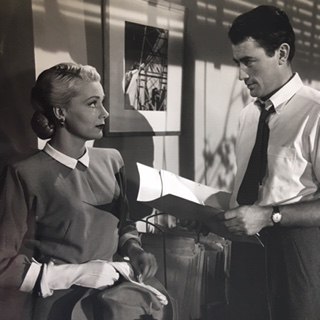It must be incredibly frustrating to have worked steadily—writing, acting, and directing. To be critically acclaimed in your assorted media. To spend decades as a constant presence in the media, going back to when you were a literal child. To have survived a toxic mother and made it out relatively okay. And after all of that, at age probably 97—your mother literally forged fake birth certificates for you as a child—to be known more for the fact that your sister took her clothes off on various stages and to have a musical that made it clear that you were the favourite.
So let’s talk about June Havoc for herself, not for her sister, because there’s a lot to be said for her. She was indeed born Ellen Evangeline Hovick in probably 1912 to the ultimate stage mother. She did indeed spend her childhood in vaudeville, first as “Baby June” and then as “Dainty June.” And she did indeed escape from her mother at age probably sixteen by getting married. Her mother apparently tried to have the marriage stopped by the cops, then tried to shoot him in the Topeka police station.
It took eight years—if nothing else, Havoc seems to have learned determination from her mother—before Havoc made her Broadway debut. Two years after that, she was in Pal Joey with Gene Kelly, and two years after that, she made her first movie beyond a couple of shorts in her “Baby June” days. It was Four Jacks and a Jill, and her character runs off with Desi Arnaz. Which is . . . surprising, in a movie from 1942. Still. Her TV debut came in 1951, which is fairly early as TV debuts go.
While Havoc was never a huge star, it’s quite clear that she was capable of a wide array of roles. She was in Gentleman’s Agreement as a Jewish woman hiding her ethnicity behind antisemitism. She toured as Mrs. Lovett in Sweeney Todd. She had her own show, wherein she apparently played a lawyer for a vaudeville troupe, so that’s . . . familiar to her in a way, presumably. And, yes, in addition to sharing a role with Angela Lansbury, she’s one of the many figures from old Hollywood who were brought onto Murder, She Wrote, which apparently Lansbury did to make sure they stayed members of the union and kept their budgets.
And, you know, okay, her sister. Which I admit makes me find it deeply funny that she did a movie called Casanova in Burlesque, because, come on, burlesque. The sisters survived. And apparently supported their mother to the end of her days, which arguably is what her mother wanted them to do, which is probably why June married and left the act. It was the only way she was going to be her own person, but instead of being defined by her mother, she is now largely defined by her sister. She deserves more notice than that.
This is one of the ways I distinguish myself from my own sisters; help with that by supporting my Patreon or Ko-fi!

